The Wireless Display Market is estimated to be valued at USD 6.0 billion in 2025 and is projected to reach USD 18.1 billion by 2035, registering a compound annual growth rate (CAGR) of 11.6% over the forecast period.
| Metric | Value |
|---|---|
| Wireless Display Market Estimated Value in (2025 E) | USD 6.0 billion |
| Wireless Display Market Forecast Value in (2035 F) | USD 18.1 billion |
| Forecast CAGR (2025 to 2035) | 11.6% |
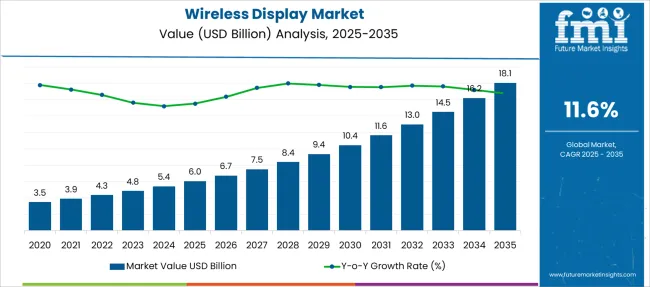
The wireless display market is experiencing rapid growth due to increasing consumer demand for seamless and cable-free connectivity between devices. The rising adoption of smart devices such as smartphones tablets and smart TVs has driven the need for efficient wireless display technologies that support high-definition content streaming and screen mirroring. Advances in wireless communication protocols and increasing compatibility across devices have improved user experience and encouraged adoption.
Growing trends in home entertainment and remote work setups have further accelerated market expansion. Additionally there is a shift towards integrated wireless display solutions in consumer electronics enhancing convenience and mobility.
Market growth is expected to continue driven by innovations in hardware components and increasing demand from the consumer application segment.
The market is segmented by Offering Type and Application and region. By Offering Type, the market is divided into Hardware, Software, and Services. In terms of Application, the market is classified into Consumer and Commercial. Regionally, the market is classified into North America, Latin America, Western Europe, Eastern Europe, Balkan & Baltic Countries, Russia & Belarus, Central Asia, East Asia, South Asia & Pacific, and the Middle East & Africa.
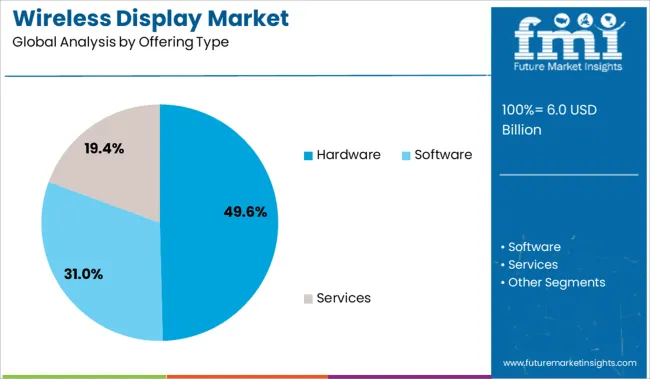
The hardware segment is projected to contribute 49.6% of the wireless display market revenue in 2025. This dominance is attributed to the critical role of physical devices such as transmitters receivers and adapters in enabling wireless display functionality. Hardware advancements have focused on improving transmission speed reducing latency and supporting higher resolution displays.
Consumers have shown a preference for hardware solutions that offer plug-and-play installation and broad compatibility with existing devices. The expanding ecosystem of wireless display hardware products addresses varied consumer needs ranging from home entertainment to professional use.
As connectivity standards evolve and demand for high-quality wireless streaming increases the hardware segment is expected to maintain its leading position.
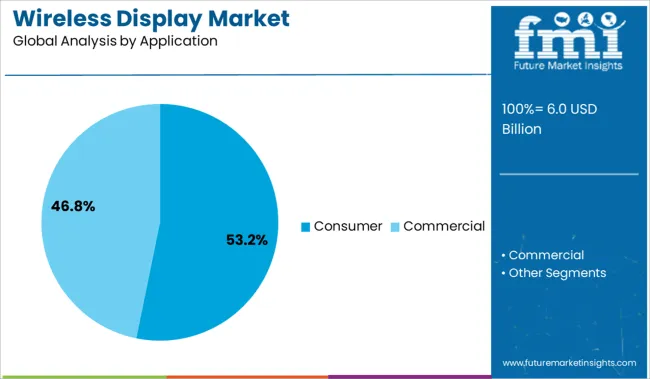
The consumer application segment is anticipated to account for 53.2% of the wireless display market revenue in 2025. This growth is driven by the widespread use of wireless display technology for streaming media gaming and screen sharing in home environments. Increasing consumer preference for convenient and flexible multimedia consumption has spurred adoption in smart homes.
The proliferation of smart TVs streaming devices and smartphones with wireless display capabilities has expanded the consumer base. Moreover consumers are leveraging wireless displays to support remote work and education needs creating additional demand.
As technology improves and prices become more accessible the consumer segment is expected to continue leading the market.
Emergence of numerous streaming solutions, including software suites and adapters is projected to change the means of learning, communication & collaboration, and entertainment in both commercial and residential applications. Various organizations across the globe are expected to rapidly adopt screen mirroring adapters to effectively collaborate and communicate with their stakeholders, including investors, clients, and employees.
Moreover, wireless computer monitors would help organizations to centralize data control and access. On account of this, these monitors are expected to be extensively used for training employees with the help of interactive techniques. At the same time, these are set to be used for the management of workforce engagement in a large number of organizational levels. Spurred by the aforementioned factors, sales of wireless displays are likely to grow at a rapid pace in the evaluation period.
HDMI cables help in connecting media devices such as gaming consoles, DVRs, Blu-rays, and cable boxes to a TV set for providing audio and video content to viewers. Nowadays, people are rapidly inclining towards HDMI wireless display receivers from conventional HDMI cables to upgrade their appliances. However, use of the former does come with certain limitations.
There are certain factors that can lower the connection quality depending on an individual’s circumstances. The majority of the HDMI wireless display kits have a distance range of about 100 to 150 feet. If an individual goes beyond that particular range, it can reduce the quality of connection.
Besides, newly launched wireless HDMI monitors by key players are expensive as they include various innovative features. Thus, not many companies, especially in underdeveloped countries can afford these products, which may decline the wireless display market growth in future.
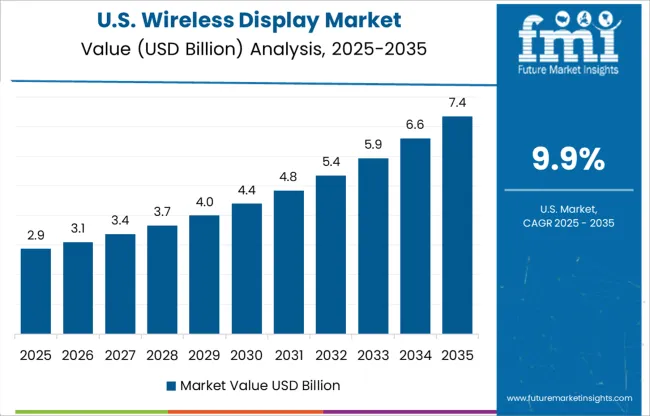
As per FMI, North America wireless display market is estimated to generate a share of about 30.2% in 2025. Increasing adoption of consumer electronics such as laptops, smartphones, and smart TVs across the USA and Canada is anticipated to push the wireless display market share in North America.
Presence of a large number of renowned wireless external monitor manufacturers across North America is another vital factor that would propel the market. California-based ScreenBeam Inc., for instance, introduced the ScreenBeam Conference. It would help in adding support for crucial video conferencing services to the company’s wireless and contactless presentation platform. ScreenBeam Conference would allow users to host a hybrid meeting by using their conferencing client tool of choice and personal laptop.
Thus, ongoing product development activities by reputed companies based in North America is anticipated to bode well for the market.
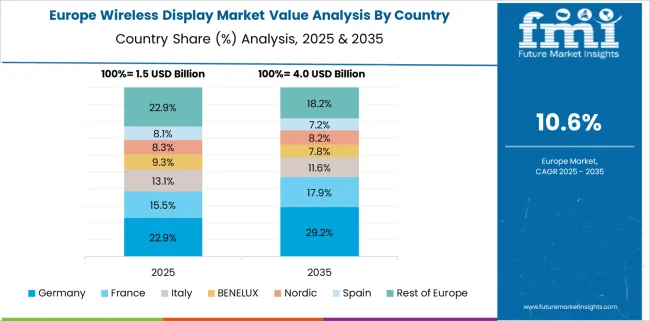
Europe wireless display market is projected to hold nearly 22.9% of share in 2025. Demand for wireless displays in Europe is expected to grow at a steady pace on the back of early adoption of wireless connectivity technologies across the UK., Italy, and Germany. Rapid expansion of the education sector in Europe with rising investments by government agencies is another vital factor that is estimated to spur growth.
As per the UK. Government, from 2024 to 2024, there were nearly 10,533,613 pupils in the country, which showcased a surge of 1.0%, as compared to 2020 to 2020. During the same period, the full-time equivalent number of teachers was 636,327 in the UK. These numbers are likely to rise in the next decade, thereby pushing the need for advanced wireless display receivers.
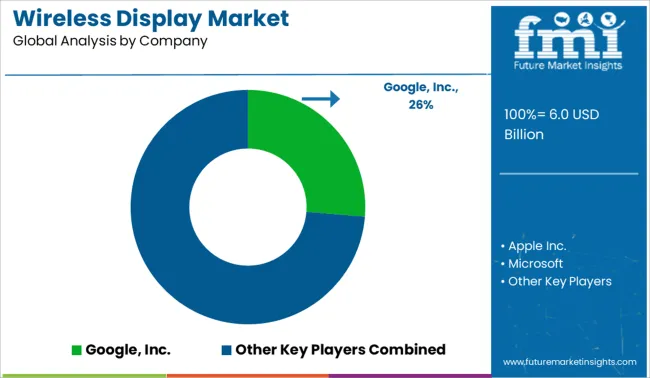
Some of the prominent companies present in the global wireless display market include Google, Inc., Apple Inc., Microsoft, Roku, Inc., Lattice Semiconductor, NETGEAR, Cavium, Actiontec Electronics, Inc., and Belkin International, Inc. among others.
The majority of the leading players are aiming to launch state-of-the-art wireless displays as per the requirements of a wide range of end-use industries. They are also joining hands with numerous educational institutions to supply their Bluetooth PC monitors for the betterment of students. A few other companies are engaging in mergers & acquisitions and joint ventures to strengthen their positions in the global wireless display market.
| Report Attribute | Details |
|---|---|
| Growth Rate | 11.6% CAGR from 2025 to 2035 |
| Market Value in 2025 | USD 6.0 billion |
| Market Value in 2035 | USD 18.1 billion |
| Base Year for Estimation | 2024 |
| Historical Data | 2020 to 2024 |
| Forecast Period | 2025 to 2035 |
| Quantitative Units | USD Million for Value |
| Report Coverage | Revenue Forecast, Company Ranking, Competitive Landscape, Growth Factors, Trends, and Pricing Analysis |
| Segments Covered | Offering Type, Application, Region |
| Regions Covered | North America; Latin America; Europe; Asia Pacific; Middle East & Africa |
| Key Countries Profiled | USA, Canada, Brazil, Mexico, Germany, France, UK, Spain, Italy, China, Japan, South Korea, India, Malaysia, Singapore, Australia, New Zealand, GCC, South Africa, Israel |
| Key Companies Profiled | Google Inc.; Apple Inc.; Microsoft; Roku, Inc.; Lattice Semiconductor; NETGEAR; Cavium; Actiontec Electronics, Inc.; Belkin International, Inc. |
| Customization Scope | Available upon Request |
The global wireless display market is estimated to be valued at USD 6.0 billion in 2025.
The market size for the wireless display market is projected to reach USD 18.1 billion by 2035.
The wireless display market is expected to grow at a 11.6% CAGR between 2025 and 2035.
The key product types in wireless display market are hardware, software and services.
In terms of application, consumer segment to command 53.2% share in the wireless display market in 2025.






Full Research Suite comprises of:
Market outlook & trends analysis
Interviews & case studies
Strategic recommendations
Vendor profiles & capabilities analysis
5-year forecasts
8 regions and 60+ country-level data splits
Market segment data splits
12 months of continuous data updates
DELIVERED AS:
PDF EXCEL ONLINE
Wireless EEG Monitoring System Market Size and Share Forecast Outlook 2025 to 2035
Wireless Refrigerant Charging Scale Market Size and Share Forecast Outlook 2025 to 2035
Wireless Hydrometer Market Size and Share Forecast Outlook 2025 to 2035
Wireless HDMI Transmitter and Receiver Market Size and Share Forecast Outlook 2025 to 2035
Wireless Access Point Market Size and Share Forecast Outlook 2025 to 2035
Wireless Video - 2.4/5GHz Market Size and Share Forecast Outlook 2025 to 2035
Wireless Polysomnography Market Size and Share Forecast Outlook 2025 to 2035
Wireless Audio Devices Market Size and Share Forecast Outlook 2025 to 2035
Wireless Communication Technologies In Healthcare Market Size and Share Forecast Outlook 2025 to 2035
Wireless Mesh Network Market Size and Share Forecast Outlook 2025 to 2035
Wireless Sensor Tags Market Size and Share Forecast Outlook 2025 to 2035
Wireless Sensor Network Market Size and Share Forecast Outlook 2025 to 2035
Wireless Power Transmission Market Size and Share Forecast Outlook 2025 to 2035
Wireless Home Security Camera Market Size and Share Forecast Outlook 2025 to 2035
Wireless Testing Market Size and Share Forecast Outlook 2025 to 2035
Wireless Power Bank Market Size and Share Forecast Outlook 2025 to 2035
Wireless Battery Monitoring System Market Size and Share Forecast Outlook 2025 to 2035
Wireless Printer Market Size and Share Forecast Outlook 2025 to 2035
Wireless Headphones Market Size and Share Forecast Outlook 2025 to 2035
Wireless Sensors Market Size and Share Forecast Outlook 2025 to 2035

Thank you!
You will receive an email from our Business Development Manager. Please be sure to check your SPAM/JUNK folder too.
Chat With
MaRIA